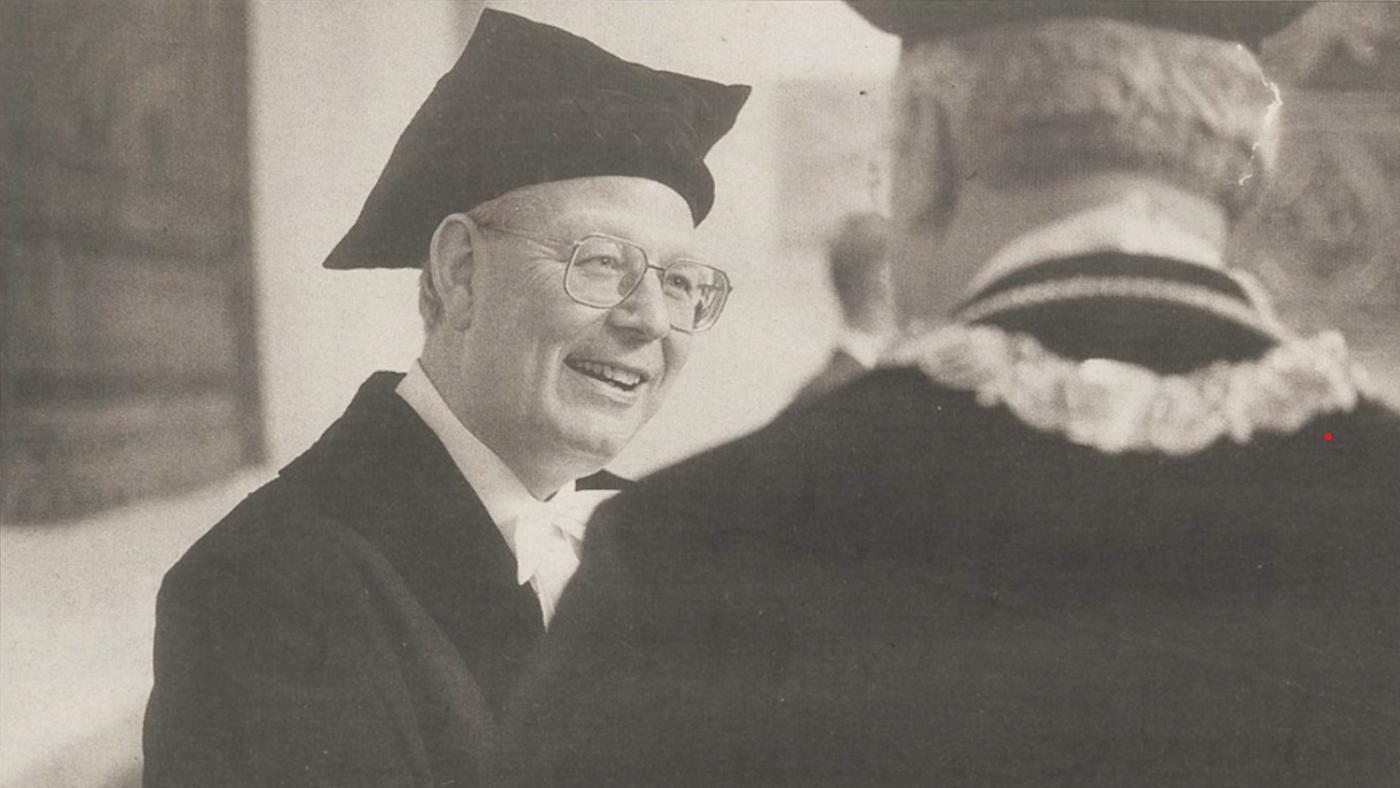Former UU rector passes away
Obituary: Hans van Ginkel, an idealistic pragmatic

“Everyone who knows me knows that I am driven by a combination of pragmatism and idealism, or rather by pragmatically pursuing my ideals. I have always used arguments to try and convince people of the benefits of teaming up with others. I have been pretty successful in that regard, at least in my opinion. In Utrecht, one of the ways I achieved this was through contacts with universities in Europe and the developing world. Networking is in my blood", van Ginkel is quoted as saying in the September 1997 edition of UBlad (the predecessor to DUB, Ed.).
That's a quote that accurately depicts the man and his career, and the response from the university community after his retirement in 1997 also attests to that. Close colleagues called him an extraordinarily kind man who could also have a good laugh. He was also described as a motivated and humble administrator with a feel for international relations.
Honorary Vugs member
Van Ginkel was born in 1940 on the Indonesian island of Sumatra, which was a Dutch colony at the time. He, his mother, and his brother were held in a Japanese prisoner-of-war camp during the Japanese occupation of Indonesia in the Second World War. His mother did not survive the camp and his father, who was a professional soldier, had to perform forced labour at the infamous Burma Railway.
After the end of World War II, Van Ginkel returned to the Netherlands, where he went to school in Roermond. Subsequently, he enrolled at the Geographical Institute at Drift. As a student, he was an active member of the study association Vugs and started a hockey career at Kampong, a sport he played for 60 years. After his studies, he started working as a scientist, obtaining his PhD in 1979 with a thesis about housing in the Randstad conurbation, assigned by the National Physical Planning Agency.
His PhD cleared the way for him to be appointed to the roles of Professor of General Social Geography in 1980 and Dean of the Interfaculty of Geography and Prehistory (under which the Social Geography programme used to be) a year later. In 1985, Van Ginkel became a member of the Executive Board, moving on to the role of rector in 1986. He was reappointed in 1990 and 1994, staying in the role of rector until 1997.
Proud of the Educatorium
Even as a rector, Van Ginkel was able to put his knowledge as a social geographer to use. He succeeded in making the university the legal owner of the area known as De Uithof (currently Utrecht Science Park), which gave the university more room to make independent decisions. During his rectorate, the university took the first steps in establishing student housing in De Uithof, and the area also gained a few striking buildings, such as the Educatorium, for which the renowned architect Rem Koolhaas was commissioned. Van Ginkel was proud of the Educatorium because it serves as a meeting point. Olympos, Parnassos and the Faculty Club are other creations of Van Ginkel's time.
Under Van Ginkel, the university decided not to move the faculties of Humanities and Law from the city centre to De Uithof. In addition, UU acquired a large part of Kromhoutkazerne to start the first University College in the Netherlands in 1988. With regards to research, he encouraged interdisciplinary collaboration and strove to pull science out of its ivory tower. He was also one of the administrators working towards raising the status of Utrecht University, stating that UU should become "the Berkeley of Europe."
Kofi Annan's colleague
In 1997, Van Ginkel left for Japan to serve as the rector of the United Nations University (UNU), a globally-operating university managed by the United Nations and headquartered in Tokyo. Its programmes focus on topics like the loss of biodiversity, desertification, inequality, and urban slums, to name but a few. Having occupied the role of UNU's Rector for ten years, Van Ginkel was a colleague (and acquaintance) of the former secretary-general Kofi Annan, among others. His son married the daughter of the Japanese emperor, which is why he had close connections to the Imperial House and even received a high imperial decoration.
Following his return to Utrecht in 2008, Van Ginkel also came back to UU as a guest professor in Sustainable Urban Futures. In addition, he was the chairman of the Institute of Social Studies in The Hague, among other boards. Van Ginkel had been suffering from health problems these past few years. He passed away on July 27 at the age of 83.
Read more: UU’s In Memoriam